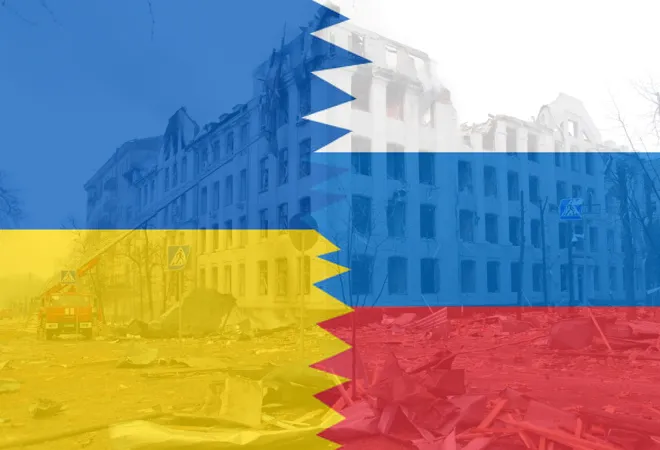-
CENTRES
Progammes & Centres
Location
Will the course and the outcome of the ongoing Russia-Ukraine war alter New Delhi's foreign policy towards Moscow?

Since the Russian invasion of Ukraine on 24 February, much of the Indian debate on the issue has been focused around dissecting the United Nations Security Council (UNSC) abstentions, issue of territorial sovereignty, need for diversification of defence imports, and the consequences for strategic autonomy due to this dependence.
As the war rages on, another question will soon emerge to become a more salient one—based on the kind of Russia that emerges from this war, which will play a role in determining the future of the bilateral strategic partnership. The unprecedented nature of sanctions imposed on Russia means that the world is in uncharted territory, as the impact of a nuclear-powered former superpower facing deep economic isolation is not a precedent one in the history of this globalised world. The worst case scenarios for the current sanctions trajectory predict enormous economic pain for Russia, rivalling the crisis of the 1990s, with a sharp drop in living standards, and rise in poverty and unemployment.
In less extreme scenarios, if sanctions are not further ramped up and some ‘neutral countries’ decide to carry on their relationship, it might not lead to an economic collapse; but will still result in a much weaker country. If Russia orients towards China to decouple from the West, and the rising power is willing to devise mechanisms to bypass sanctions, then it would become the key to economic survival of Russia under the current sanctions regime. If this path is undertaken, given the pace and extent of shift, in the short to medium term, Moscow will exercise considerably less leverage in its relations with China, which can be especially damaging during an evolving international order. This outcome, of course, will depend on China being willing to come to the aid of Russia in a full-fledged manner.
The unprecedented nature of sanctions imposed on Russia means that the world is in uncharted territory, as the impact of a nuclear-powered former superpower facing deep economic isolation is not a precedent one in the history of this globalised world.
If Russia is unable to reach an agreement that leads to the worst of the sanctions being lifted, it would deal a body blow to its positioning as a reinvigorated post-Soviet state that is an independent pole in a multipolar world. In this scenario of a long-drawn out sanctions regime, it is unclear if all leading non-Western states would be willing to align themselves with Russia, if their national interests seem to be adversely impacted. In addition, as Russia would (at least in the medium term) see a decline in its own power projection capacities, it would not be able to escape the impact of its invasion on its interests in other regions of the world.
Already the war has exposed the extent of economic weakness of Russia, something that has often been pointed out as its greatest challenge, which cannot be overcome simply by looking towards China as its main trading partner instead of the European Union. For instance, Russia’s policy positioning in a rapidly evolving Indo-Pacific was facing challenges, not only due to a committed pushback by regional states against an increasingly aggressive China; but also due to its own weak capacities on the ground. A decade after its own pivot to the East, Moscow remains a minor economic player in Asia-Pacific driven by an inability to be part of the regional value chains, and with limited influence over the pace of regional changes.
Till now, these weaknesses were mitigated through building of independent relationships with regional powers like India and Vietnam; and steps to improve ties with other regional players including ASEAN, Japan, and South Korea. When taken alongside its domestic stability and ability to use available resources to steadily expand influence across Central Asia, Caucasus, West Asia, and even Afghanistan without over-stretching; it made Russia a ‘good enough’ power that exercised its influence across various regional geographies, and especially in Eurasia. This also ensured that despite the asymmetrical power vis-á-vis Beijing, Moscow still managed to exercise its own version of neutrality in China’s territorial disputes involving other Asian countries, including India.
However, given the current intensity of western sanctions and Russia looking to China for a bail-out, it is likely that this would lead to a decimation of Russian capacity to be an influential player in Eurasia, whilst further weakening its already faltering pivot to the East. This is an outcome that would deeply trouble India, whose foreign policy includes Russia as an important partner across the continental Eurasian space. Whether in Central Asia or Afghanistan or West Asia, Moscow’s influence was seen in a positive light. India also has extensive multilateral linkages that include the former superpower.
Already the war has exposed the extent of economic weakness of Russia, something that has often been pointed out as its greatest challenge, which cannot be overcome simply by looking towards China as its main trading partner instead of the European Union.
Before the invasion, India was focusing on furthering its ties with Russia, including setting up a 2+2 Foreign and Defence Ministers’ dialogue to exchange views on global and regional political-security developments. As a strategic partner, Russia’s role in all of the above mentioned domains was considered both essential and valuable. The invasion of Ukraine now complicates these calculations for New Delhi, and raises important questions regarding the future of Russia in the emerging world order.
It is clear that India is not pleased with the Russian invasion and its disenchantment stems from the rise of factors that will not only directly impact Indo-Russia ties, but also the broader geopolitical environment where India will have fewer choices than it had before Russia decided to invade Ukraine. However, if the current trajectory is not reversed, is India ready to fundamentally recalibrate its foreign policy across Eurasia in a truncated timeframe, even as the regional system itself comes under stress?
The one outcome where India’s choices are not starkly limited includes one in which Russia and Ukraine reach a deal that brings peace to Ukraine, addresses key concerns of the parties, and creates conditions for a gradual lifting of at least the worst of the sanctions. This would both prevent a shock to the regional order in Eurasia and give India the time and space it needs to decide the future trajectory of policy towards Russia in a way that does not cause immediate damage to its interests.
Some Indian commentators have raised the prospect of a mediation effort, to both stem an ongoing humanitarian catastrophe and also preserve its own national interests. It might not be enough on its own, but if combined with efforts of other countries friendly towards Russia, it might create an incentive for Russia to engage in serious negotiations with Ukraine. It might also be relevant to discuss with the Western partners the use of leverage they hold through sanctions in modifying Russian behaviour. Are the sanctions a long-term means to weaken Russia in the hope of a regime change, or are they to be used to help strike a lasting deal and end the ongoing war? The Western role in how the war ends will be a crucial one, because the core issues of European security would not be addressed solely through any future Russia-Ukraine deal. While Moscow will inevitably have to come down from its maximalist positions, the US and the EU must also take the chance to establish a credible dialogue process. Although the instinct at the moment is to punish Russia for its actions, it is important for all the sides to avoid repeating the mistakes of the post-Cold War period in which compromise deals were seen as an anathema.
It is clear that India is not pleased with the Russian invasion and its disenchantment stems from the rise of factors that will not only directly impact Indo-Russia ties, but also the broader geopolitical environment where India will have fewer choices than it had before Russia decided to invade Ukraine.
It is clear that Russian security concerns about NATO expansion notwithstanding, its miscalculations and over-estimation of its own capacities have led it to launch a war that now threatens to undo decades of progress across domestic and foreign policy domains. In addition, several of its own myths ranging from being a fortress to disunity of the West to Ukraine’s views about Russia have come crumbling down. If Russia learns to reckon with these realities while not being an isolated, disgruntled nuclear power with a Security Council veto; the outcome would be far more beneficial for long-term stability in Europe.
If Russia cannot arrive at a negotiated deal and the war drags on alongside the sanctions pressure, India might well be forced to re-evaluate the contours of its long-standing partnership with Russia. However, if New Delhi chooses to reach this point without making efforts to actively influence the outcome in its favour and to persuade Russia towards a comprehensive deal with its adversaries and vice versa, it would be simply allowing its own foreign policy to be dictated by the uncontrolled ramifications of the Russian invasion and western response. As Russia-Ukraine talks continue, India should be looking to remind Russia of the benefits of not being an isolated entity and use its offices to prevent an outcome that takes control of its foreign policy out of its own hands.
The views expressed above belong to the author(s). ORF research and analyses now available on Telegram! Click here to access our curated content — blogs, longforms and interviews.

Nivedita Kapoor is a Post-doctoral Fellow at the International Laboratory on World Order Studies and the New Regionalism Faculty of World Economy and International Affairs ...
Read More +